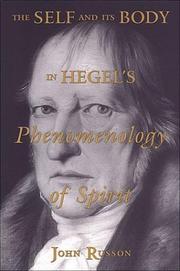| Listing 1 - 3 of 3 |
Sort by
|
Book
ISBN: 9781399510974 1399510975 1399510991 1399511009 Year: 2023 Publisher: Edinburgh : Edinburgh University Press,
Abstract | Keywords | Export | Availability | Bookmark
 Loading...
Loading...Choose an application
- Reference Manager
- EndNote
- RefWorks (Direct export to RefWorks)
Ryan Johnson and Biko Mandela Gray study the relationship between Hegel's 'Phenomenology of Spirit' and Black thought from Frederick Douglass to Angela Davis. This staging of an elongated dialectical parallelism between Hegel's classic text and major 19th-20th-century Black thinkers explodes the Western canon of philosophy.

ISBN: 0802084826 0802009190 9786612008511 128200851X 1442682345 9781442682344 9780802084828 Year: 1997 Volume: *7
Abstract | Keywords | Export | Availability | Bookmark
 Loading...
Loading...Choose an application
- Reference Manager
- EndNote
- RefWorks (Direct export to RefWorks)
A major criticism of Hegel's philosophy is that it fails to comprehend the experience of the body. In this book, John Russon shows that there is in fact a philosophy of embodiment implicit in Hegel's Phenomenology of Spirit. Russon argues that Hegel has not only taken account of the body, but has done so in a way that integrates both modern work on embodiment and the approach to the body found in ancient Greek philosophy.Although Russon approaches Hegel's Phenomenology from a contemporary standpoint, he places both this standpoint and Hegel's work within a classical tradition. Using the Aristotelian terms of 'nature' and 'habit,' Russon refers to the classical distinction between biological nature and a cultural 'second nature.' It is this second nature that constitutes, in Russon's reading of Hegel, the true embodiment of human intersubjectivity. The development of spirit, as mapped out by Hegel, is interpreted here as a process by which the self establishes for itself an embodiment in a set of social and political institutions in which it can recognize and satisfy its rational needs. Russon concludes by arguing that self-expression and self-interpretation are the ultimate needs of the human spirit, and that it is the degree to which these needs are satisfied that is the ultimate measure of the adequacy of the institutions that embody human life.This link with classicism - in itself a serious contribution to the history of philosophy -provides an excellent point of access into the Hegelian system. Russon's work, which will prove interesting reading for any Hegel scholar, provides a solid and reliable introduction to the study of Hegel.
Body [Human ] (Philosophy) --- Body [Human ]--Philosophy --- Cogito --- Corps humain (Philosophie) --- Corps humain--Philosophie --- Human body (Philosophy) --- Ik (Filosofie) --- Lichaam [Menselijk ] (Filosofie) --- Lichaam [Menselijk ]--Filosofie --- Menselijk lichaam (Filosofie) --- Moi (Philosophie) --- Self (Philosophy) --- Body, Human (Philosophy) --- Hegel, Georg Wilhelm Friedrich, --- Philosophy --- Hegel, Georg Wilhelm Friedrich --- Phänomenologie des Geistes (Hegel, Georg Wilhelm Friedrich) --- Phenomenology (Hegel, Georg Wilhelm Friedrich) --- Phenomenology of mind (Hegel, Georg Wilhelm Friedrich)
Book
ISBN: 0253050677 Year: 1976 Publisher: Indiana University Press
Abstract | Keywords | Export | Availability | Bookmark
 Loading...
Loading...Choose an application
- Reference Manager
- EndNote
- RefWorks (Direct export to RefWorks)
The last decade has seen the reanimation with violence and vitriol of some of the oldest errors of political thought. Perhaps their common spirit is an enthusiasm for shallow and abstract principles along with an accompanying impatience to act now at all costs. Professor Earle has grouped some of these abstractions under the title "Public Sorrows: Ideology"; they include radicalism, the absolute authority of personal conscience, pacifism, the reduction of philosophy to expertise, and the absurd celebration of civilization. He asks whether it is not time to re-open discussion of these stages of the mind, and he invites the reader to reflect on the paradoxes, ironies, and dialectical complexities of social reality. A second part, entitled "Private Pleasures: Philosophy," looks into the mystical, transcendental life of the self in its first-person singularity. If that singularity must experience a certain defeat confronted with a nature whose character is for us hypothetical, this second section looks into a region where the spirit need not be humiliated or alienated: into art, surrealism, subjectivity, and autobiography—domains more valuable because they are closer to home and to the mind's final destiny. This book is not directed solely to philosophers, but will interest the thoughtful layman as well.
Truth. --- Spirit. --- Self (Philosophy) --- Philosophy. --- Ideology. --- Consciousness. --- Moi (Philosophie) --- Philosophie. --- Ideologie. --- Hegel, Georg Wilhelm Friedrich, --- Phänomenologie des Geistes (Hegel, Georg Wilhelm Friedrich) --- Knowledge, Theory of --- Philosophy --- Political science --- Psychology --- Thought and thinking --- Mental philosophy --- Humanities --- Pneuma --- Pneumatology (Philosophy) --- Pneumatology (Theology) --- Holy Spirit --- Soul --- Apperception --- Mind and body --- Perception --- Spirit --- Self --- Conviction --- Belief and doubt --- Skepticism --- Certainty --- Necessity (Philosophy) --- Pragmatism --- Phenomenology (Hegel, Georg Wilhelm Friedrich) --- Phenomenology of mind (Hegel, Georg Wilhelm Friedrich)
| Listing 1 - 3 of 3 |
Sort by
|

 Search
Search Feedback
Feedback About UniCat
About UniCat  Help
Help News
News